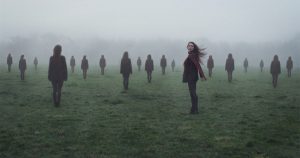 The Yogabliss on-line Moving into Meditation class met this morning. I think we gather for many reasons which, for me, include connection, caring, inspiration, meaning and solace. This week we witnessed the needless death of George Floyd. We watched the responding protests and civil unrest mounting intensity. Each of us brought our grieving hearts to practice. We drew inspiration from lyric poet Gregory Orr. In an NPR story about his work, Gregory states, “I believe in poetry as a way of surviving the emotional chaos, spiritual confusions, and traumatic events that come with being alive.”
The Yogabliss on-line Moving into Meditation class met this morning. I think we gather for many reasons which, for me, include connection, caring, inspiration, meaning and solace. This week we witnessed the needless death of George Floyd. We watched the responding protests and civil unrest mounting intensity. Each of us brought our grieving hearts to practice. We drew inspiration from lyric poet Gregory Orr. In an NPR story about his work, Gregory states, “I believe in poetry as a way of surviving the emotional chaos, spiritual confusions, and traumatic events that come with being alive.”
Gregory found his way to poetry four years after accidentally killing his brother in a hunting accident when he was twelve years old. He found a way of expressing his deeper story about the event his family was never able to talk about. As a young man he nearly died during the civil rights movement when as a member of the Student Nonviolent Coordinating Committee (SNCC) he was jailed and severely beaten. His work contains a sense of urgency about finding meaning and voice. You can hear Gregory talk about his story in this On Being interview, Shaping Grief with Language.
Guided Relaxation
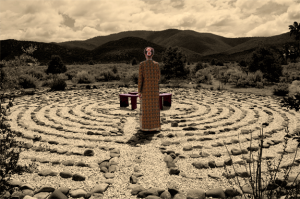 We can find a sense of sanctuary in our circle that can allow us to come home to ourselves and feel what we feel. We listen deeply to ourselves so that we might listen deeply to each other. Now more than ever we need to be able to listen, to learn and to understand one another. Our circle can serve as a container for our difficult emotions, our painful memories and our fears about the future. Our circle is almost like a life raft floating on the turbulent waters of our times. We support each other in being – the kind of being that offers the time in which our deeper stories can emerge. Our deeper stories tell what is true. Our deeper stories contain the seeds of healing. Our truths are embodied. Our healing is embodied.
We can find a sense of sanctuary in our circle that can allow us to come home to ourselves and feel what we feel. We listen deeply to ourselves so that we might listen deeply to each other. Now more than ever we need to be able to listen, to learn and to understand one another. Our circle can serve as a container for our difficult emotions, our painful memories and our fears about the future. Our circle is almost like a life raft floating on the turbulent waters of our times. We support each other in being – the kind of being that offers the time in which our deeper stories can emerge. Our deeper stories tell what is true. Our deeper stories contain the seeds of healing. Our truths are embodied. Our healing is embodied.
Close your eyes and turn your awareness to being . . . sensing your body’s place in space and how you are connected to the earth . . . feel your body breathing . . . not having to change your breathing in any way . . . feel your your heart pulsing . . . now notice what sensations make themselves known . . . being . . . feeling . . . breathing . . . Notice the presence of any emotion . . . how the feeling expresses in your body . . . Notice the mind state that may be present . . . maybe a lingering thought or many mixed together . . . Being in this moment . . . feeling . . . and breathing . . . . all of what you are bringing to practice . . . If possible let there be a tender allowing for your whole being . . .
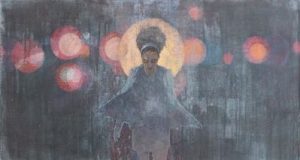 Let your awareness rest in your body . . . notice where your attention is drawn . . . contact the felt sense of this area . . . no need to search for anything . . . just allow yourself to be . . . If you find your attention wandering just witness the process of coming back to what it’s like to be fully present . . . perhaps with a place that yearns for your attention . . . that truly needs to begin healing . . . You may find a deeper story that may be told with feeling, imagery, memory, sensation.
Let your awareness rest in your body . . . notice where your attention is drawn . . . contact the felt sense of this area . . . no need to search for anything . . . just allow yourself to be . . . If you find your attention wandering just witness the process of coming back to what it’s like to be fully present . . . perhaps with a place that yearns for your attention . . . that truly needs to begin healing . . . You may find a deeper story that may be told with feeling, imagery, memory, sensation.
We’ve learned to cover over our deeper stories with all the strategies and defenses we develop in order to feel safe, approved of and loved. Over time our defenses harden and create the kind of suffering we are witnessing in our streets today. All of us have a deeper story of vulnerability and tenderness. We can become aware of our unconcious fears and limiting beliefs. Our deeper stories contain our hurts and unmet needs. We can become aware of how they influence the way we experience the world. When we bring compassionate presence to our inner life we find meaning and we begin to heal. As we heal ourselves we develop the capacity to be a compassionate witness to others.
Lyric poet Gregory Orr describes our lives of uncertainty and desire for meaning:
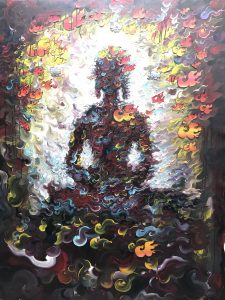 . . . we ordinary people, in our daily lives, we experience enormous amounts of disorder and confusion. It’s inside us. It’s in our past. It’s in the unknowable future. So disorder is a part of our life. We all know that. We also know that we need order, that some kind of patterns reassure us: the sun rising, the stars and the moon, the seasons. . . the habits that reassure us about the world. And we . . . navigate our lives with this kind of interplay of disorder and order. . . .
. . . we ordinary people, in our daily lives, we experience enormous amounts of disorder and confusion. It’s inside us. It’s in our past. It’s in the unknowable future. So disorder is a part of our life. We all know that. We also know that we need order, that some kind of patterns reassure us: the sun rising, the stars and the moon, the seasons. . . the habits that reassure us about the world. And we . . . navigate our lives with this kind of interplay of disorder and order. . . .
Our willingness to be present . . . offers us a chance to become aware of how we are buffeted by the world . . . to feel compassion for the hurts we bear and the hurts we cause . . . . We can feel empathy and grow in understanding our human condition – the basic needs we all share. To be understood and to understand. Gregory continues:
To be a human is to be continually at risk. Risk is our existential condition. None of us knows what’s going to happen next. . . . we are embodied beings . . .The personal lyric clings to embodied being, insists that we stay in our bodies . . .Coming down into the body, coming down into claiming our stories — whether we can go past those stories, we don’t know. We can slip back into the darkness, as individuals, as a culture. And so I don’t have hope, but I do recommend courage . . .
Our deeper stories are written in and on the body. We come to know our bodies through feeling. We claim our deeper stories through feeling. Now more than ever we need to build our capacity to listen. To hear the deeper stories of others with compassionate presence. Gregory suggests that claiming our stories can be transformational:
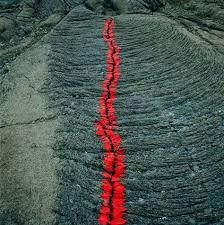 The way forward, I think, is also through more dark. . . . I think another thing that scares us is rage. Those who have been harmed, one response is shame. That’s where they turn the rage in on the self. We all know that, have done that. . . . But you can also turn the rage outward. . . . That’s terrifying. Rage among humans, intimate rage, rage when we’re near people who are feeling rage and anger. And again, this is part of our legacy. . . . And I think we share mysteries, but we also share passions. . . . We all experience joy. . . . But they’re the commonality for us, and anger is one of those. They won’t go away. We don’t have a solution to our passions.
The way forward, I think, is also through more dark. . . . I think another thing that scares us is rage. Those who have been harmed, one response is shame. That’s where they turn the rage in on the self. We all know that, have done that. . . . But you can also turn the rage outward. . . . That’s terrifying. Rage among humans, intimate rage, rage when we’re near people who are feeling rage and anger. And again, this is part of our legacy. . . . And I think we share mysteries, but we also share passions. . . . We all experience joy. . . . But they’re the commonality for us, and anger is one of those. They won’t go away. We don’t have a solution to our passions.
And I think one of our spiritual tasks, in my notion of secular religion, is . . . to . . . take responsibility for what we consider to be meaningful statements of being, meaningful in the sense that we can walk in the darkness, our own darkness, stepping, using . . . poems and songs and pieces of wisdom as solid footing for our journey. . . .
During this turbulent time in our lives, we are making our way forward through the darkness. We are witnessing the outward erruptions of rage that spring from deeper stories. We can reflect on how we can foster understanding. Each of us can, as Gregory says, “take responsibility for meaningful statements of being.” In finding meaning, in acting courageously, we can help to heal ourselves and heal our society.
Here is one of Gregory’s poems:
This is what was bequeathed us:
This earth the beloved left
And, leaving,
Left to us.
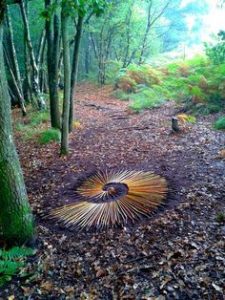 No other world
No other world
But this one:
Willows and the river
And the factory
With its black smokestacks.
No other shore, only this bank
On which the living gather.
No meaning but what we find here.
No purpose but what we make.
That, and the beloved’s clear instructions:
Turn me into song; sing me awake.
